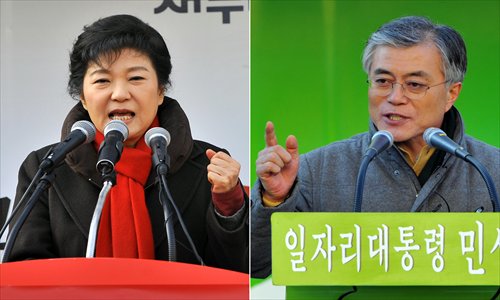SK rivals in final push for votes

With just one day to go before South Korea's presidential election, the two candidates are pushing hard to win over voters, especially the undecided in a race that has so far been too close to call.
Ruling conservative New Frontier Party candidate Park Geun-hye, 60, daughter of late president Park Chung-hee, who is credited with the county's rapid economic development but hard rule that overlooked human rights, asked voters to pave a new era under what would be the country's first female president.
Park used the terms "motherly," and "first female president," in her latest televised press conference Tuesday morning in a bid to stoke conservatives' nostalgia for her parents who are popular among older, more conservative voters.
"I will restore the 'Let's Live Well' miracle once again," she said, referring to a song used during the rapid economic development under her father's rule.
Park traveled Tuesday across the country from Busan in the south to Seoul in the north, while the opposition party Democratic United Party (DUP) candidate Moon Jae-in, 59, moved in the opposite direction.
Moon, a close friend and former chief of staff to late President Roh Moo-hyun, rapidly emerged as a contender only a few months ago when no one seemed strong enough to beat Park.
Moon, a human rights lawyer, urged citizens to participate in the vote as experts say a high turnout would benefit him. Moon labeled the last five years as an "era in despair" and said "abstention is turning a blind eye to the wrongs of the last five years."
The most recent polls, published six days before the election, showed that Park had a lead over Moon that was within the margin of error.
If younger voters turn out in greater than expected numbers, the election result will be favorable for Moon, the DUP and other political watchers say. Park's supporters, older and conservative voters, have turned out in force in previous elections.
This is the second time that Park, one of the most powerful politicians in South Korea, is attempting to enter the presidential Blue House after she lost the bid to enter the election to President Lee Myung-bak. She has vowed to retire from the political scene if she is not elected this time.
Throughout the campaign, however, both candidates failed to differentiate themselves in terms of their policies.
Both candidates claimed South Korea should achieve "economic democratization" which is aimed at resolving a growing social disparity between the rich and the poor, and chaebol or conglomerates and small- and medium-sized businesses.
Park and Moon both promised to correct an economy led by chaebol, such as Samsung Electronics and Hyundai Motors, although Park is believed to have a softer stance toward them.
At least 70 percent of the more than 40 million people eligible to vote will head to the polls Wednesday, according to South Korea's National Election Commission.